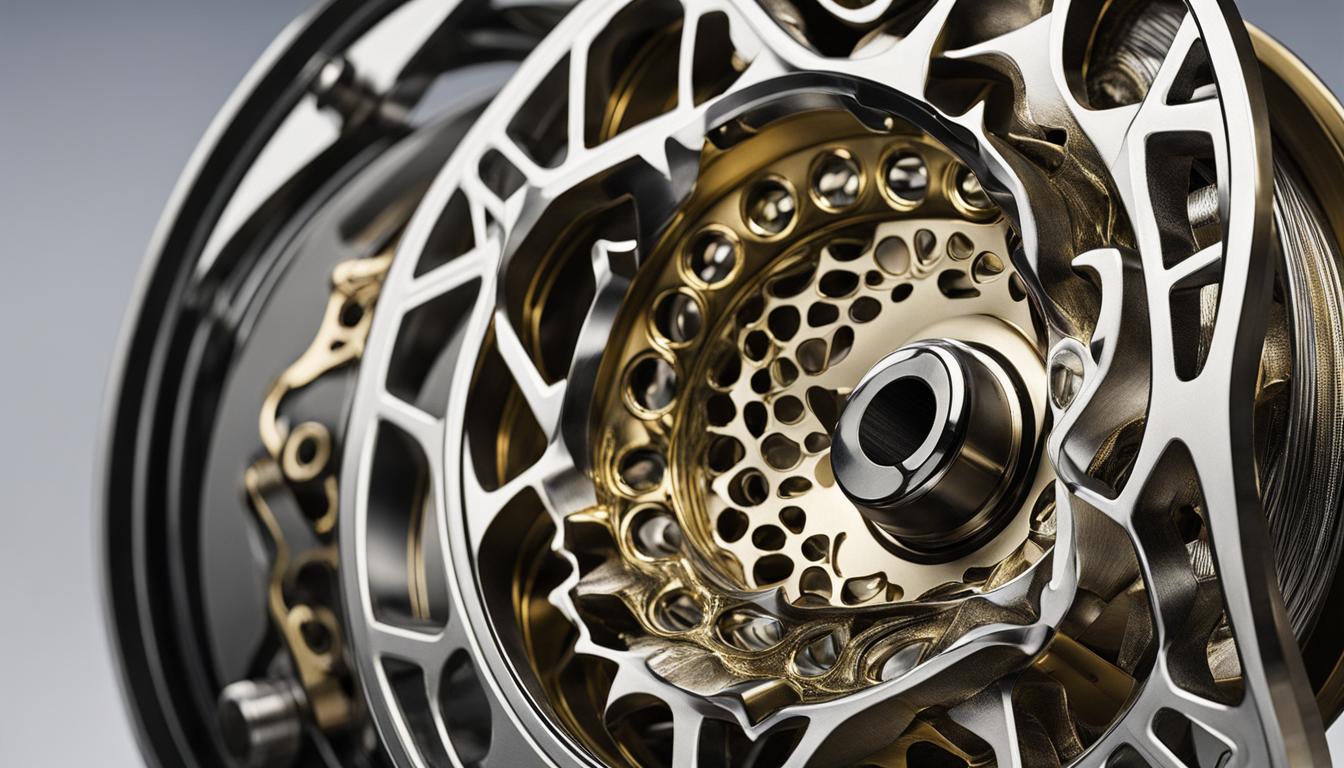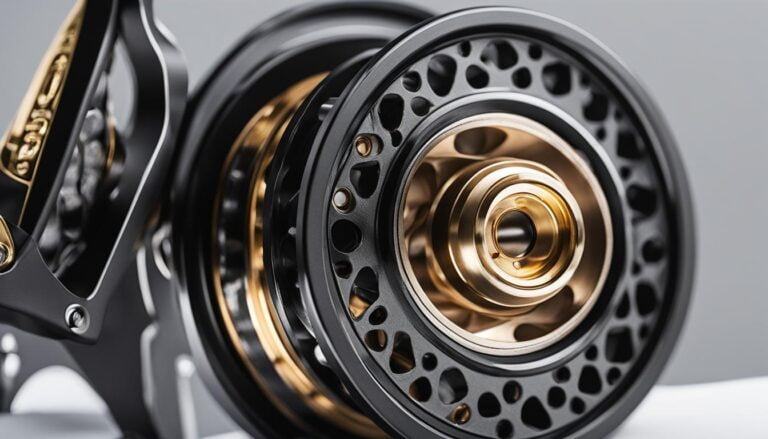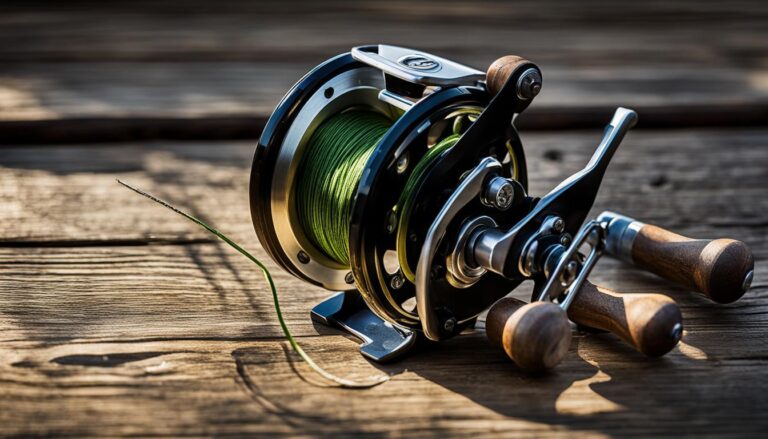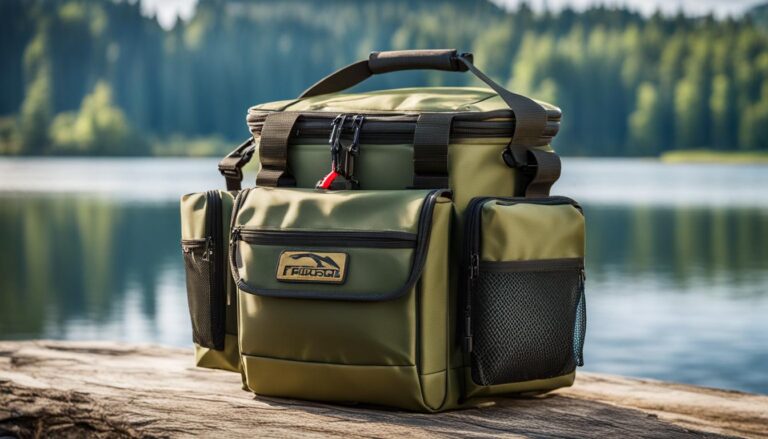Discover High-Quality Fishing Reel Spools for Your Next Trip

When it comes to upgrading your fishing game, having high-quality fishing reel spools can make all the difference. Whether you’re in need of a replacement spool or looking to invest in a new one, it’s important to choose a reel spool that offers smooth casting, better control, and longer-lasting performance. By selecting the right fishing reel spools, you can enhance your fishing experience and increase your chances of catching more fish effortlessly.
Key Takeaways:
- High-quality fishing reel spools enhance your fishing experience
- Choosing the right spool improves casting distance and control
- Consider factors such as line capacity and fishing reel line capacity chart
- Fishing reel spool sizes vary based on fishing needs
- Spare fishing reel spools offer flexibility during fishing trips
Choosing the Right Spinning Reel Spools
When it comes to selecting fishing reel spools, spinning reel spools are a popular choice. These spools are versatile and easy to use, making them suitable for both beginners and experienced anglers. When choosing spinning reel spools, there are a few key factors to consider.
Line Capacity
The line capacity of a spinning reel spool determines how much fishing line it can hold. It is important to select a spool with the appropriate line capacity for your fishing needs. A larger line capacity allows you to use heavier fishing line, which is ideal for targeting larger fish species. On the other hand, a smaller line capacity is suitable for lighter fishing lines and finesse fishing techniques.
Line Control
Another important consideration when choosing spinning reel spools is line control. Look for spools that provide smooth and consistent line management, allowing for efficient casting and retrievals. Spools with good line control will help minimize line twists and tangles, ensuring a hassle-free fishing experience.
Durability
Lastly, consider the durability of the spinning reel spools. Look for spools made from high-quality materials that can withstand the rigors of fishing. This includes factors such as resistance to corrosion and impact. Choosing durable spools ensures they will last longer and perform reliably, even in challenging fishing conditions.
| Factors to Consider | Spinning Reel Spools |
|---|---|
| Line Capacity | Choose a spool size that matches your fishing needs. |
| Line Control | Look for spools that offer smooth and consistent line management. |
| Durability | Select spools made from high-quality materials that can withstand the rigors of fishing. |
Exploring Baitcasting Reel Spools

When it comes to advanced fishing techniques and targeting larger fish species, baitcasting reels are a top choice among anglers. Baitcasting reel spools are specifically designed to provide precise control and accuracy, making them ideal for casting heavy lines and lures. By understanding the key features and considerations when selecting baitcasting reel spools, you can optimize your fishing experience and increase your chances of success on the water.
Fishing Reel Line Capacity
One important factor to consider when choosing baitcasting reel spools is the fishing reel line capacity. Line capacity refers to the amount of fishing line that the spool can hold. It is crucial to select a spool with an appropriate line capacity for your fishing needs. A larger line capacity allows you to use heavier fishing lines, which can be advantageous when targeting larger fish species that require stronger lines. On the other hand, a smaller line capacity is suitable for lighter fishing lines and finesse fishing techniques. Consider the type of fish you are targeting and the fishing conditions you will encounter to determine the optimal line capacity for your baitcasting reel spool.
Key Considerations for Baitcasting Reel Spool Selection
When exploring baitcasting reel spools, there are several key considerations to keep in mind. First, ensure that the spool is compatible with your baitcasting reel model. Different reels may have specific spool requirements, so it is essential to choose a spool that fits properly. Additionally, pay attention to line control features such as spool tension and braking systems, as they contribute to accurate casting and reducing backlash. Lastly, consider the drag system of the spool, which determines the resistance experienced when reeling in a fish. A smooth and reliable drag system is crucial for battling strong fish and preventing line breakage.
| Considerations | Description |
|---|---|
| Line Capacity | Ensure the spool can hold the appropriate amount of fishing line for your needs. |
| Compatibility | Select a spool that is compatible with your baitcasting reel model. |
| Line Control | Look for features such as spool tension and braking systems to enhance casting accuracy and prevent backlash. |
| Drag System | Choose a spool with a smooth and reliable drag system to handle strong fish and prevent line breakage. |
By considering these factors and selecting the right baitcasting reel spools, you can optimize your fishing setup and improve your chances of landing the big catch. Remember to experiment with different adjustments and techniques to find the best setup that works for your fishing style and target species.
Understanding Fishing Reel Line Capacity
When choosing fishing reel spools, it’s essential to have a good understanding of fishing reel line capacity. Fishing reel line capacity refers to the amount of fishing line that the spool can hold, and it plays a crucial role in determining the type of fish you can target and the fishing techniques you can employ.
The line capacity of a fishing reel spool is typically measured in yards, and it’s important to choose a reel spool with the appropriate line capacity for your fishing needs. A larger line capacity allows you to use heavier fishing line, which is beneficial when targeting larger fish species. On the other hand, a smaller line capacity is suitable for lighter fishing line and finesse fishing techniques.
To help you determine the optimal line capacity for your reel spool, you can refer to a fishing reel line capacity chart. These charts provide valuable information on the recommended line capacities for different reel sizes and fishing techniques, giving you a clear idea of the line capacity options available to you.

Table: Fishing Reel Line Capacity Chart
| Reel Size | Line Capacity (lbs/yards) | Recommended Fishing Techniques |
|---|---|---|
| 1000 | 4/180 | Ultra-light fishing, finesse techniques |
| 2500 | 6/220 | Light to medium fishing, freshwater applications |
| 4000 | 10/200 | Medium to heavy fishing, saltwater applications |
| 8000 | 20/300 | Big game fishing, deep-water fishing |
By consulting a fishing reel line capacity chart and considering factors such as the type of fish you are targeting and the fishing conditions you will be facing, you can choose a reel spool with the appropriate line capacity that will allow you to fish with confidence and improve your chances of success on the water.
Exploring Different Fishing Reel Spool Sizes
When it comes to selecting the right fishing reel spool, size matters. The size of the spool can have a significant impact on your fishing experience, affecting line capacity, casting distance, and overall reel performance. Understanding the different fishing reel spool sizes available can help you make an informed decision and choose the spool that best suits your fishing needs.
There are generally two main categories of fishing reel spool sizes: small spools and large spools. Small spools are typically used for light tackle fishing, finesse techniques, and targeting smaller fish species. These spools offer advantages such as increased line control and reduced weight, making them ideal for precision casting. On the other hand, large spools are preferred for targeting larger fish species and casting heavier lines. They provide greater line capacity and can handle the increased tension and weight associated with bigger fish.
It’s important to consider the type of fishing you plan to do and the size and weight of the fish you are targeting when choosing a spool size. If you enjoy finesse fishing or plan to target smaller fish, a small spool may be the right choice for you. Conversely, if you’re aiming for larger fish or need to cast heavier lines, a large spool will better suit your needs. By selecting the appropriate spool size, you can optimize your fishing gear and improve your chances of success on the water.
Table: Fishing Reel Spool Sizes
| Spool Size | Recommended Use |
|---|---|
| Small | – Light tackle fishing – Finesse techniques – Targeting smaller fish |
| Large | – Targeting larger fish – Casting heavier lines |
Remember, the choice of fishing reel spool size is just one aspect to consider when selecting your reel. Other factors such as line capacity, construction quality, gear ratio, and drag system should also be taken into account. By carefully evaluating these factors and matching them to your fishing style and target species, you can create a well-rounded fishing setup that meets your specific needs.
Investing in Spare Fishing Reel Spools
When it comes to fishing, having spare fishing reel spools can be a game-changer. Whether you’re on a long fishing trip or targeting different fish species, having extra spools allows you to quickly switch between fishing lines and techniques without the hassle of respooling your reel. This means less time spent on maintenance and more time spent on actual fishing.
When investing in spare fishing reel spools, it’s important to ensure compatibility with your reel model. Make sure the spare spools have the same line capacity as your primary spool, as this will ensure seamless transitions between spools without any impact on performance. Having spare spools also provides increased flexibility on the water, allowing you to adapt to changing fishing conditions or experiment with different line types.
Additionally, it’s a good idea to consider the specific fishing scenarios you may encounter. For example, if you’re planning to fish in environments where line breakage or damage is more likely, having spare spools with pre-spooled lines can save you valuable time and effort. By having spare fishing reel spools readily available, you can make the most of your fishing experience and maximize your chances of success on every trip.
Investing in spare fishing reel spools may seem like a small detail, but it can have a big impact on your overall fishing experience. With the convenience and flexibility that spare spools offer, you’ll be able to adapt to different fishing situations and make the most of your time on the water. So, don’t overlook the importance of having spare spools in your fishing gear arsenal – they could be the key to unlocking greater fishing success.

| Benefits of Investing in Spare Fishing Reel Spools: |
|---|
| Quickly switch between fishing lines and techniques |
| Save time and effort on respooling |
| Increased flexibility and adaptability on the water |
| Prevent line breakage or damage in challenging fishing environments |
Reviewing Top Fishing Reel Brands and Models
When it comes to choosing fishing reel spools, brand reputation plays a significant role in determining quality and performance. Some of the top fishing reel brands include Okuma, Daiwa, Abu Garcia, Pflueger, and Shimano. Each brand offers a range of reel models in different sizes and spool options. When selecting a brand and model, consider factors such as construction, gear ratio, drag system, and customer reviews. This will help ensure that you choose a fishing reel spool that meets your specific needs and delivers reliable performance.
The Top Fishing Reel Brands
| Brand | Features | Top Models |
|---|---|---|
| Okuma | High-quality construction, smooth drag system | Cedros CJ-65S, Helios HSX-30 |
| Daiwa | Advanced technology, precision engineering | Tatula LT, BG MQ |
| Abu Garcia | Durable and lightweight design, excellent casting performance | Revo SX, Ambassadeur C4 |
| Pflueger | Smooth drag system, ergonomic design | President XT, Supreme XT |
| Shimano | Innovative features, reliable performance | Stradic CI4+, Curado DC |
Each of these brands offers a wide range of fishing reel models suitable for different fishing techniques and skill levels. Whether you’re a beginner or an experienced angler, there’s a fishing reel spool available that will meet your specific requirements.
When researching different fishing reel models, consider the features and specifications that are important to you. Are you looking for a lightweight reel with excellent casting performance? Or do you prioritize durability and a smooth drag system? By identifying your needs and preferences, you can narrow down the options and choose a fishing reel spool that will enhance your fishing experience.
Additionally, reading customer reviews and ratings can provide valuable insights into the performance and reliability of different fishing reel models. Take the time to research and compare the feedback from other anglers to ensure that you make an informed decision.
Pros and Cons of Different Fishing Reel Spools
When it comes to fishing reel spools, each type has its own set of advantages and disadvantages. Understanding these pros and cons can help you make an informed decision when choosing the right spool for your fishing needs.
Spinning Reel Spools
Pros: Spinning reel spools are versatile and user-friendly, making them a popular choice for beginners and experienced anglers alike. They offer easy casting, smooth line control, and are generally more forgiving when it comes to line tangles. Spinning reel spools are also available in various sizes, offering flexibility for different fishing techniques.
Cons: While spinning reel spools are easy to use, they may not provide the same level of casting distance as baitcasting reel spools. Additionally, they may not offer the same level of casting accuracy and control, especially in windy conditions. Spinning reel spools are also more prone to line twist, requiring occasional maintenance and attention.
Baitcasting Reel Spools
Pros: Baitcasting reel spools are favored by experienced anglers for their precise control and accuracy. They allow for precise lure placement and are suitable for targeting larger fish species. Baitcasting reel spools also provide better line capacity and can handle heavier fishing lines, making them ideal for more demanding fishing conditions.
Cons: Baitcasting reel spools have a steeper learning curve compared to spinning reel spools. They require more practice and skill to master accurate casting techniques. Baitcasting reels are also generally more expensive than spinning reels and may require more maintenance to ensure optimal performance.
| Spool Type | Pros | Cons |
|---|---|---|
| Spinning Reel Spools | Versatile and user-friendly | May have limited casting distance and control |
| Baitcasting Reel Spools | Precise control and accuracy for targeting larger fish species | Requires more practice, skill, and maintenance |
Factors to Consider When Choosing Fishing Reel Spools
When it comes to selecting fishing reel spools, there are several factors you should consider to ensure that you make the right choice for your fishing needs. By evaluating these factors, you can enhance your fishing experience and maximize your chances of success on the water.
1. Type of Fishing
- Consider the type of fishing you plan to do. Are you a fan of spinning reels or do you prefer baitcasting reels? Each type of reel has its own unique characteristics, and the choice of spool should align with your preferred fishing style.
- For spinning reels, opt for spinning reel spools that offer smooth line control and a suitable line capacity. These spools are known for their versatility and ease of use, making them ideal for beginners and experienced anglers alike.
- Baitcasting reel spools, on the other hand, are designed for precision and accuracy. Look for spools with the appropriate line capacity and control features to ensure optimal performance.
2. Target Fish Species
Different fish species require different fishing techniques and tackle. Consider the size and weight of the fish you plan to target when choosing your reel spools. Smaller fish may require lighter line and finesse techniques, while larger species may demand heavier line capacity and more robust spools.
3. Fishing Conditions
The fishing conditions you will be facing also play a significant role in selecting the right fishing reel spools. If you frequently fish in saltwater or harsh environments, look for spools that are corrosion resistant and can withstand the elements.
4. Construction and Performance
Pay attention to the construction quality of the reel spools you are considering. Look for durable materials and reliable performance features such as smooth drag systems and efficient line retrieval.
By considering these factors, you can confidently choose fishing reel spools that are tailored to your specific fishing needs and preferences. Remember to evaluate the type of fishing, target fish species, fishing conditions, and construction quality to ensure a successful and enjoyable fishing experience.
Conclusion
Upgrading your fishing reel spools is a wise investment that can greatly enhance your fishing experience. Whether you’re in need of a replacement spool or looking to upgrade, choosing high-quality spools is essential. With smooth casting, better control, and durability, these spools can significantly improve your chances of catching more fish effortlessly.
When selecting fishing reel spools, consider factors such as spool size, line capacity, and the type of reel that suits your needs and fishing style. Whether you prefer spinning reels or baitcasting reels, there are options available to cater to your preferences. By selecting the right spool size and line capacity, you can enhance your casting distance, improve line management, and ultimately have a more successful and enjoyable fishing trip.
Remember, having spare fishing reel spools is also advantageous, especially during long fishing trips or when targeting different fish species. Spare spools allow for quick and seamless transitions without the need to respool your reel. Ensure that the spools are compatible with your reel model and have the same line capacity as your primary spool.
So, take the time to evaluate your fishing needs and choose the fishing reel spools that will best suit you. With the right spools in your arsenal, you’ll be well-prepared to tackle any fishing challenge and make the most of your time on the water. Happy fishing!
FAQ
Why is it important to choose high-quality fishing reel spools?
High-quality fishing reel spools offer smooth casting, better control, and longer-lasting performance, which can enhance your fishing experience and increase your chances of catching more fish effortlessly.
What type of fishing reel spool is suitable for beginners?
Spinning reel spools are versatile and easy to use, making them a great option for both beginners and experienced anglers.
What factors should I consider when choosing spinning reel spools?
Consider factors such as line capacity, line control, and durability. Ensure that the spool is compatible with your fishing rod and reel, and choose a size that suits your fishing needs.
What are baitcasting reel spools designed for?
Baitcasting reel spools are designed to provide precise control and accuracy, making them ideal for targeting larger fish species.
What factors should I consider when choosing baitcasting reel spools?
Pay attention to factors such as line capacity, line control, and drag system. Choose a spool that can handle the weight and size of the fishing line you plan to use.
What is fishing reel line capacity?
Fishing reel line capacity refers to the amount of fishing line that the spool can hold. It is important to choose a reel spool with the appropriate line capacity for your fishing needs.
What factors should I consider when choosing the size of a fishing reel spool?
The size of the spool will influence factors such as line capacity, casting distance, and overall reel performance. Consider the type of fishing you plan to do and the size and weight of the fish you are targeting.
Why should I invest in spare fishing reel spools?
Spare spools allow you to quickly switch between different fishing lines or fishing techniques without the need to respool your reel, providing increased flexibility on the water.
What fishing reel brands are considered top-quality?
Some of the top fishing reel brands include Okuma, Daiwa, Abu Garcia, Pflueger, and Shimano.
What are the pros and cons of spinning reel spools and baitcasting reel spools?
Spinning reel spools offer ease of use and versatility but may not have the same level of casting distance as baitcasting reel spools. Baitcasting reel spools provide greater control and accuracy but may require more skill to master.
What factors should I consider when choosing fishing reel spools?
Consider factors such as the type of fishing you plan to do, the target fish species, the fishing conditions, and your personal fishing style. Additionally, evaluate the construction quality, line capacity, gear ratio, and drag system of the reel spool.






